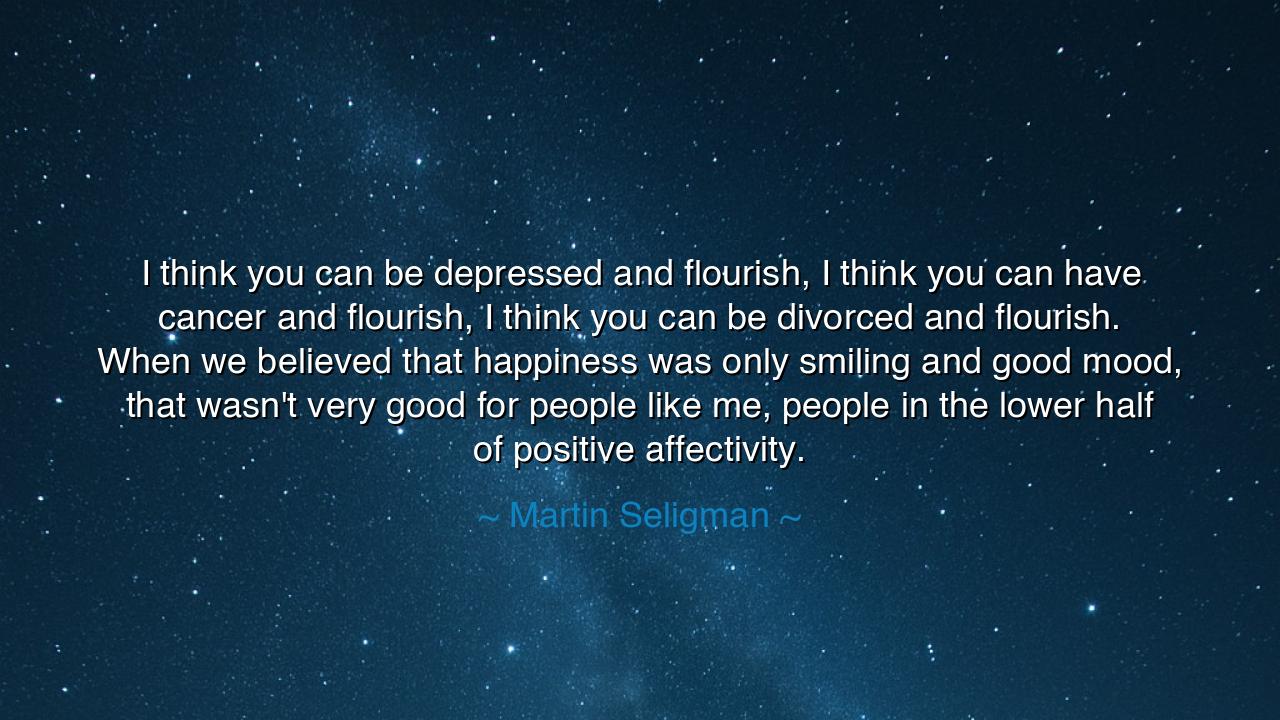
I think you can be depressed and flourish, I think you can have
I think you can be depressed and flourish, I think you can have cancer and flourish, I think you can be divorced and flourish. When we believed that happiness was only smiling and good mood, that wasn't very good for people like me, people in the lower half of positive affectivity.






The modern sage of the mind, Martin Seligman, father of positive psychology, once spoke these luminous and paradoxical words: “I think you can be depressed and flourish, I think you can have cancer and flourish, I think you can be divorced and flourish. When we believed that happiness was only smiling and good mood, that wasn’t very good for people like me, people in the lower half of positive affectivity.” In this, he gives voice to one of the deepest truths of human life — that flourishing does not mean the absence of pain, but the presence of meaning. His wisdom reminds us that even in suffering, even in the shadows of despair, there can still be growth, beauty, and light.
The origin of this insight lies in Seligman’s lifelong journey to redefine what it means to live well. For centuries, happiness was seen as the ultimate goal — a golden state of joy and pleasure. Yet Seligman, after decades of studying the human condition, saw that this definition excluded much of humanity. The ill, the grieving, the brokenhearted — were they then unworthy of happiness? He knew this could not be so. Thus, he sought a richer understanding of well-being — one that embraced resilience, purpose, and authenticity. To him, the human spirit is not meant for constant cheerfulness, but for endurance and transcendence. Happiness, in his vision, is not the unbroken sun, but the courage to shine between storms.
When he says, “you can be depressed and flourish,” he is not romanticizing suffering — he is revealing its transformative power. For even in depression, one may find compassion for others, depth of thought, and spiritual humility. When he says “you can have cancer and flourish,” he is speaking to those who face mortality and yet live with love, gratitude, and grace. When he says “you can be divorced and flourish,” he honors those who have lost what they cherished and still dare to rebuild. To flourish, then, is not to escape pain, but to weave it into the fabric of strength. It is to recognize that life’s worth is measured not by the absence of sorrow, but by the courage to create meaning in its presence.
The ancients, too, understood this truth. The Stoic Epictetus, born a slave and crippled in body, taught that happiness lies not in circumstances, but in mastery of the mind. Viktor Frankl, the psychiatrist and survivor of Auschwitz, discovered that even in the deepest darkness, one may find light through purpose. He wrote, “Those who have a ‘why’ to live can bear almost any ‘how.’” Seligman’s modern teaching is born from this same lineage — the realization that flourishing is the union of suffering and strength, the alchemy by which pain becomes wisdom. The flourishing soul is not untouched by fire; it is forged within it.
To live by Seligman’s words is to abandon the shallow idol of constant happiness. It is to accept that life’s melody includes both harmony and dissonance. When he speaks of “people in the lower half of positive affectivity,” he speaks for those who feel deeply, who may not always smile easily, who walk through life with the weight of reflection. He reminds them — and all of us — that such souls are not broken; they are profound. For their joy is not surface brightness, but a radiance that grows from honesty. Their flourishing is quieter, but no less real — it is the bloom of the heart that has weathered winter.
Consider the story of Helen Keller, who lost sight and hearing at a young age. By the world’s standards, her happiness should have been impossible. Yet her courage, curiosity, and love for learning made her life a symphony of triumph. She wrote, “Although the world is full of suffering, it is also full of the overcoming of it.” This is what Seligman calls flourishing — not perfection, but persistence; not unbroken joy, but the will to grow through adversity. Keller did not merely survive her challenges; she transformed them into tools of light for humanity. So too may every one of us.
Let the lesson, then, be spoken clearly: you are not defined by your suffering, but by your response to it. To flourish is to rise, even when you cannot run; to reach, even when your hands tremble. The path of flourishing is paved with both tears and triumphs. It is built upon the daily choice to create meaning, to nurture gratitude, and to serve others — even when the heart is heavy. Do not seek a happiness that denies pain; seek a strength that transcends it.
And so, as the ancients might say, the soul that flourishes is the one that loves life in all its shades — joy and sorrow, loss and renewal. Martin Seligman’s truth is a call to the brave: to embrace imperfection, to honor our wounds as part of our wholeness. For even in darkness, the soul that dares to grow shines with a different kind of light — not the bright blaze of cheer, but the steady, eternal flame of resilient hope.






AAdministratorAdministrator
Welcome, honored guests. Please leave a comment, we will respond soon